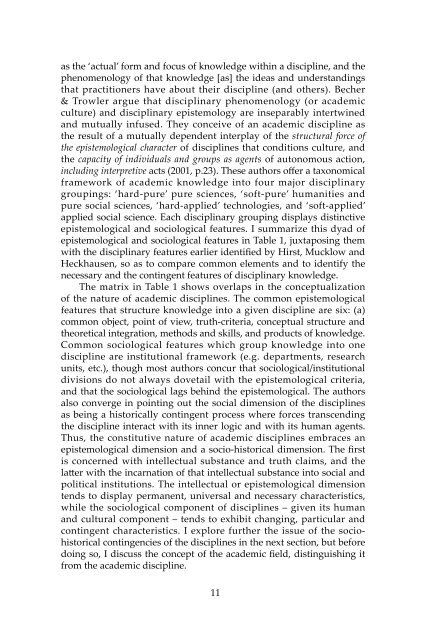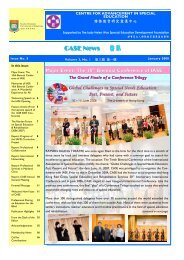Comparative Education Bulletin - Faculty of Education - The ...
Comparative Education Bulletin - Faculty of Education - The ...
Comparative Education Bulletin - Faculty of Education - The ...
You also want an ePaper? Increase the reach of your titles
YUMPU automatically turns print PDFs into web optimized ePapers that Google loves.
as the ‘actual’ form and focus <strong>of</strong> knowledge within a discipline, and the<br />
phenomenology <strong>of</strong> that knowledge [as] the ideas and understandings<br />
that practitioners have about their discipline (and others). Becher<br />
& Trowler argue that disciplinary phenomenology (or academic<br />
culture) and disciplinary epistemology are inseparably intertwined<br />
and mutually infused. <strong>The</strong>y conceive <strong>of</strong> an academic discipline as<br />
the result <strong>of</strong> a mutually dependent interplay <strong>of</strong> the structural force <strong>of</strong><br />
the epistemological character <strong>of</strong> disciplines that conditions culture, and<br />
the capacity <strong>of</strong> individuals and groups as agents <strong>of</strong> autonomous action,<br />
including interpretive acts (2001, p.23). <strong>The</strong>se authors <strong>of</strong>fer a taxonomical<br />
framework <strong>of</strong> academic knowledge into four major disciplinary<br />
groupings: ‘hard-pure’ pure sciences, ‘s<strong>of</strong>t-pure’ humanities and<br />
pure social sciences, ‘hard-applied’ technologies, and ‘s<strong>of</strong>t-applied’<br />
applied social science. Each disciplinary grouping displays distinctive<br />
epistemological and sociological features. I summarize this dyad <strong>of</strong><br />
epistemological and sociological features in Table 1, juxtaposing them<br />
with the disciplinary features earlier identified by Hirst, Mucklow and<br />
Heckhausen, so as to compare common elements and to identify the<br />
necessary and the contingent features <strong>of</strong> disciplinary knowledge.<br />
<strong>The</strong> matrix in Table 1 shows overlaps in the conceptualization<br />
<strong>of</strong> the nature <strong>of</strong> academic disciplines. <strong>The</strong> common epistemological<br />
features that structure knowledge into a given discipline are six: (a)<br />
common object, point <strong>of</strong> view, truth-criteria, conceptual structure and<br />
theoretical integration, methods and skills, and products <strong>of</strong> knowledge.<br />
Common sociological features which group knowledge into one<br />
discipline are institutional framework (e.g. departments, research<br />
units, etc.), though most authors concur that sociological/institutional<br />
divisions do not always dovetail with the epistemological criteria,<br />
and that the sociological lags behind the epistemological. <strong>The</strong> authors<br />
also converge in pointing out the social dimension <strong>of</strong> the disciplines<br />
as being a historically contingent process where forces transcending<br />
the discipline interact with its inner logic and with its human agents.<br />
Thus, the constitutive nature <strong>of</strong> academic disciplines embraces an<br />
epistemological dimension and a socio-historical dimension. <strong>The</strong> first<br />
is concerned with intellectual substance and truth claims, and the<br />
latter with the incarnation <strong>of</strong> that intellectual substance into social and<br />
political institutions. <strong>The</strong> intellectual or epistemological dimension<br />
tends to display permanent, universal and necessary characteristics,<br />
while the sociological component <strong>of</strong> disciplines – given its human<br />
and cultural component – tends to exhibit changing, particular and<br />
contingent characteristics. I explore further the issue <strong>of</strong> the sociohistorical<br />
contingencies <strong>of</strong> the disciplines in the next section, but before<br />
doing so, I discuss the concept <strong>of</strong> the academic field, distinguishing it<br />
from the academic discipline.<br />
11
















